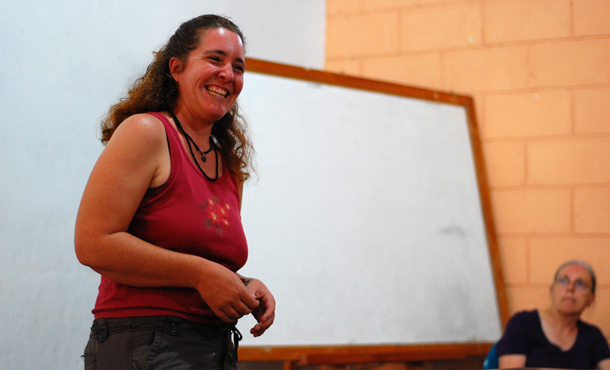Even though Jeanette Nisly fell in love with Guatemala on a cross-cultural with Eastern Mennonite University (EMU), she never would have dreamed that she would return four months after she graduated, marry a Guatemalan, have two children, and remain for 17 years.
Nisly, who majored in nursing at EMU, is the in-country coordinator for the Guatemala operation of a nonprofit group, Concern America. Located in Petén, the country’s largest department (equivalent to a large U.S. state), Nisly leads trainings that widely impact Petén’s population of 650,000, – one that has experienced much violence, including death threats and murders of healthcare workers.
Guatemala, under its current unstable and corrupt political system, is not an easy place for Nisly to work in some respects, yet she is passionate about Concern America’s philosophy.
“Concern America trains local populations in health, education, agriculture, and/or environmental health (appropriate technology),” according to its website. From its home base in Santa Ana, Calif., this international development and refugee aid organization aims to help local populations gain the knowledge and skills they need to staff and run their own fully functional systems.
Though she loves her work, Nisly looks forward to the day when she can offer her services elsewhere because Guatemalans are doing her work as well or better, she said in an interview via Skype in early January 2013. “Everything we do focuses on teaching and empowering other people to do things that maybe they didn’t realize they could do.”
The end of 2012 found Nisly training groups of health-promoting practitioners, who typically have attended local schools through grade 4, and midwives, many of whom are illiterate. These Guatemalans make a four-year commitment to study with Concern America for one week every two months. Between their studies, they put what they have learned into practice, attending to the health needs of some of the most marginalized populations in Guatemala.
The approach of alternating study and practice is one that Nisly herself is pursuing as a current EMU graduate student, studying online for her master of science in nursing (MSN). “All other [nursing master’s] programs I looked at required leaving the country and the work in order to go to school, and I wasn’t willing to do that.”
She also knew that the EMU approach to an MSN would be compatible with her own religious beliefs and lifestyle practices. Raised Mennonite, Nisly now works closely with the Roman Catholic Church, with which Concern America partners for its work in Guatemala.
With 500 midwives and health-promoting practitioners trained by the Catholic Church’s health program in Petén, Nisly has seen basic health care rippling out to almost every hamlet of Guatemala. “They [the health promoters and midwives] provide most of the health care services for their communities,” she said. “I don’t know where [else] health-promoting practitioners are able to care for such a wide range of complex health issues.”
By the end of two years of training, these practitioners are able to attend to common digestive, respiratory, skin, urinary, reproductive, oral, traumatic (including basic suturing and tendon repairs), chronic (including diabetes, cardiac issues, and epilepsy), tropical disease and nutritional issues, says Nisly. “They are able to assist midwives in difficult births, like breech babies and postpartum hemorrhage. Their education includes a strong foundation in physiology, pathophysiology, and pharmacology.”
The Petén program is widely viewed as a model one, causing observers from other Concern America projects around the world to visit in the hope of adopting the model to their situations, said Nisly.
The workers trained by Concern America are up against a system that does not work for or with them, Nisly said. For instance, health-promoting practitioners and midwives are taught to refer pregnant women with high blood pressure to a hospital for more care, but sometimes these women are sent home without treatment, where some have died. “One of the big challenges,” she sighed, “is not having a referral system that we can rely on.”
She leans on this insight once given to her: “The only thing that is going to limit you, and what you can do here, is yourself.” As a result, she has learned to tap “the resources that are available to me,” rather than “being limited by what I think I know and what I should be able to do.”
After graduating from EMU in 1996, Nisly worked for a three years with Eastern Mennonite Missions before beginning her work with Concern America. She is fluent in Spanish and the indigenous Mayan language of Q’eqchi’. She is the author of the first comprehensive health guide in the Q’eqchi’ language, published in 2005. It is similar to the well-known manual “Where There Is No Doctor.”
An EMU cross-cultural group led by Ann and Jim Hershberger stopped in Petén in February 2013 to see the work of Nisly and Concern America.
Although she functions in a leadership role, Nisly reiterated multiple times that, “we work here as a team” and that her work could not be successful without the help and support of others in the organization.
